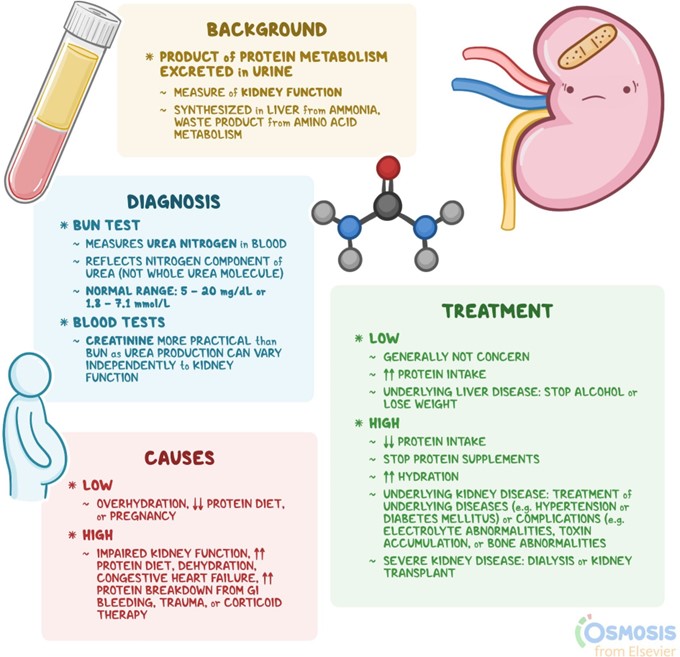A nurse is assessing a client who has fluid volume deficit. The nurse should expect which of the following findings?
Increased BUN
Increased urine ketones
Decreased urine specific gravity
Decreased Hgb
The Correct Answer is A
Choice A Reason: This is correct because BUN stands for blood urea nitrogen, which is a waste product of protein metabolism that is excreted by the kidneys. Increased BUN indicates fluid volume deficit, as the blood becomes more concentrated and the kidneys have less fluid to filter. A normal BUN level is 7 to 20 mg/dL. The nurse should monitor the client's fluid intake and output, weight, and serum electrolytes, and administer fluids as ordered.
Choice B Reason: This is incorrect because urine ketones are not related to fluid volume deficit, but to diabetic ketoacidosis, which is a complication of diabetes mellitus that occurs when the body breaks down fat for energy and produces ketones as a by-product. Increased urine ketones indicate diabetic ketoacidosis, which can cause
dehydration, acidosis, and coma. A normal urine ketone level is negative or trace. The nurse should monitor the client's blood glucose, pH, and bicarbonate levels, and administer insulin and fluids as ordered.
Choice C Reason: This is incorrect because urine specific gravity is a measure of the concentration of solutes in the urine. Decreased urine specific gravity indicates fluid volume excess, as the urine becomes more diluted and the kidneys excrete more fluid. A normal urine specific gravity range is 1.005 to 1.030. The nurse should monitor the client's fluid balance, vital signs, and edema, and administer diuretics as ordered.
Choice D Reason: This is incorrect because Hgb stands for hemoglobin, which is a protein in red blood cells that carries oxygen. Decreased Hgb indicates anemia, which is a condition that occurs when the blood has a low number of red blood cells or hemoglobin. Anemia can cause fatigue, weakness, and pallor. A normal Hgb level for adult males is 14 to 18 g/dL and for adult females is 12 to 16 g/dL. The nurse should monitor the client's oxygen saturation, iron level, and blood transfusion needs, and administer iron supplements or erythropoietin as ordered.

Nursing Test Bank
Naxlex Comprehensive Predictor Exams
Related Questions
Correct Answer is C
Explanation
Choice A: Client is currently prescribed spironolactone is incorrect because spironolactone is a potassium-sparing diuretic that can cause hyperkalemia, or high potassium level, not hypokalemia, or low potassium level. Spironolactone works by blocking the action of aldosterone, which is a hormone that regulates sodium and potassium balance in the body.
Choice B: Client reports drinking 3.5 to 4 L of water each day is incorrect because drinking excessive water can cause hyponatremia, or low sodium level, not hypokalemia. Hyponatremia occurs when the water intake exceeds the water output, diluting the sodium concentration in the blood.
Choice C: Client has an NG tube to gastric suction is correct because gastric suction can cause hypokalemia by removing gastric fluids that contain potassium. Gastric suction can also cause metabolic alkalosis, which is a condition where the blood pH is high and the HCO3 is high, indicating a loss of metabolic acids or an excess of bicarbonate in the body. Metabolic alkalosis can cause potassium to shift from the extracellular fluid to the intracellular fluid, thus lowering the serum potassium level.
Choice D: Client has a history of alcohol abuse disorder is incorrect because alcohol abuse can cause hypomagnesemia, or low magnesium level, not hypokalemia. Hypomagnesemia occurs when there is inadequate intake or excessive loss of magnesium, which is an essential mineral for many enzymatic reactions in the body.
Hypomagnesemia can impair the secretion and action of parathyroid hormone, which regulates calcium and phosphorus balance in the body.
Correct Answer is B
Explanation
Choice A: A client who is taking a thiazide diuretic is not at risk for metabolic acidosis, but rather for metabolic alkalosis. This is a condition that occurs when the body has too much bicarbonate or loses too much acid. This can happen in patients who take thiazide diuretics, which increase the excretion of sodium, chloride, and water, but also cause the retention of bicarbonate.
Choice B: A client who has diarrhea is at risk for metabolic acidosis, because this condition occurs when the body produces too much acid or loses too much bicarbonate. This can happen in patients who have diarrhea, which causes the loss of intestinal fluids that contain bicarbonate and other bases.
Choice C: A client who is vomiting is not at risk for metabolic acidosis, but rather for metabolic alkalosis. This is a condition that occurs when the body has too much bicarbonate or loses too much acid. This can happen in patients who have vomiting, which causes the loss of gastric fluids that contain hydrochloric acid and other acids.
Choice D: A client who has salicylate intoxication is at risk for metabolic acidosis, because this condition occurs when the body produces too much acid or loses too much bicarbonate. This can happen in patients who have salicylate intoxication, which is a toxic reaction to aspirin or other salicylates. Salicylates increase the production of organic acids and interfere with the renal excretion of acids.
Whether you are a student looking to ace your exams or a practicing nurse seeking to enhance your expertise , our nursing education contents will empower you with the confidence and competence to make a difference in the lives of patients and become a respected leader in the healthcare field.
Visit Naxlex, invest in your future and unlock endless possibilities with our unparalleled nursing education contents today
Report Wrong Answer on the Current Question
Do you disagree with the answer? If yes, what is your expected answer? Explain.
Kindly be descriptive with the issue you are facing.
